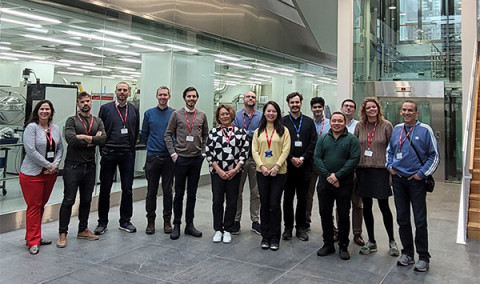Neuropic project holds its annual general meeting in Cork, Ireland, with "differents goals"

NEUROPIC, a Pathfinder project coordinated by the Material Science Institute of Madrid (ICMM-CSIC), held its annual general meeting this week at the Tyndall National Institute, located in Cork (Ireland). As well as this important meeting, the international consortium took the opportunity to meet with Phormic, a European project focused on programmable photonic chips. "During the first year, we have achieved different goals", explains P. David García, ICMM-CSIC researcher and coordinator of the project.
He attended the meeting alongside Cefe López, ICMM-CSIC researcher as well, and Gloria González, the project consultant. The meeting aimed to monitor the progress of the project since its start in March 2023, and the results are as expected. "Our first task is to build up our neural network", he reminds and explains that the consortium has spent a few months in the design "of the single node of that network: our optomechanical neuron".
In fact, "different geometrical parameters have been tested to make it optimal at ICMM", adds the researcher. In parallel, DTU and Beamfox teams have been working on optimizing the fabrication process. "The electron-beam lithography to fabricate our systems is a very mature fabrication method that, as surprising as it might appear, is susceptible to further development", says García, who also explains that the teams have found "additional knobs to trick to make the fabrication of our systems even better (with high spatial resolution)." Finally, Tyndall and Fincotec are designing the optimal approach to couple light from the output world into the neural network: "Different approaches have been discussed and we are still working on that", states García.
In the NEUROPIC project, European researchers, innovators, and companies in nanotechnology, photonics, advanced manufacturing, and complex systems join forces to explore programmability using nano-electro-mechanical technology and its applications in neuromorphic computing.
The teams, from four European countries, are imitating in electronic devices how the human brain works through a complex system of interconnected neurons. It is known as neuromorphic computing, an alternative way of processing information different from standard computers or mobile phones. They will also do so with a new and sustainable approach: "We propose using thermal energy from the system to create this type of artificial neurons," says García.
The consortium is formed by two Universities (the Technical University of Denmark and University College Cork), two Iberian Research Institutes (INL and ICMM-CSIC), and two small-medium-sized companies (Beamfox and Ficontec) from five different EU countries (Denmark, Ireland, Germany, Portugal and Spain). While the Iberian centers are working on designing and characterizing these complex optomechanical systems, it will be in Denmark where the prototypes systems will be manufactured (which will be studied again in Spain). The partners from Ireland and Germany, for their part, will collaborate with the DTU in the development and manufacture of the final prototype of the system. The Researcher Cefe López (PC Group) is also participating in the project from the ICMM.
For its part, PHORMIC aims at establishing an European pilot line for next-generation programmable photonic chips for product developers in diverse application domains. The meeting between both projects had the objective of knowing each other and exploring possible synergies in their research, covering programmable and neuromorphic photonics, photonic MEMS, phononics, light source integration, and the scaling of optical and electrical IOs.
Instituto de Ciencia de Materiales de Madrid (ICMM)
Sor Juana Ines de la Cruz, 3
Cantoblanco, 28049
Madrid, España
Telephone: (+34) 91 334 90 00
Email: @email
Communication Office: @email

Acknowledge the Severo Ochoa Centres of Excellence program through Grant CEX2024-001445-S/ financiado por MICIU/AEI / 10.13039/501100011033

Contacto | Accesibilidad | Aviso legal | Política de Cookies | Protección de datos
